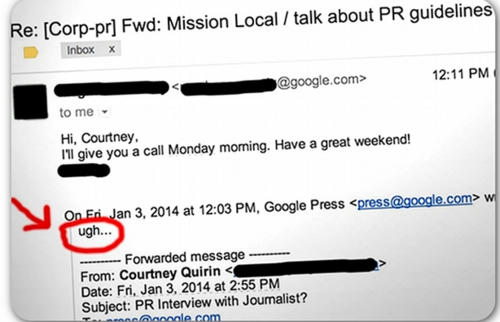
If you are having an internal discussion about how to handle a media inquiry, especially if that conversation is taken place via e-mail, it’s generally advisable not to share the contents of that discussion with media member making said inquiry. That would seem to be some pretty simple blocking and tackling, no?
Apparently not, given two examples this week of what would seem to be very smart people forgetting this very basic, fundamental rule of media relations.
Example 1: In responding to a FOIA request from an investigative reporter, the US Navy inadvertently shared with said reporter an internal exchange in which it strategizes ways to work around the request and not provide the documents he’s asking for. This one is particularly egregious, as it pulls the curtain back on a government institution working to thwart public access to what should be public information and documentation.
Example 2: While less serious than the Navy example, all it took for this one to blow up in Google’s face was one word: “ugh.” That was the response one member of Google’s press team sent to another upon receiving a media inquiry about the uproar the search giant’s private shuttles are causing in San Francisco and Oakland. The second member of Google’s press team subsequently responded directly to the initial inquiry, complete with “ugh” still included.
This shouldn’t be necessary, of course, but a couple of important reminders out of these snafus:
1) If you’re going to have an internal discussion about a media inquiry, especially a conversation that may not be entirely positive because you’re not a fan of the inquiry or inquirer, try to have it in person or over the phone if at all possible.
2) If that’s not possible, try to avoid including that conversation in your response and subsequent dialogue with the inquirer.